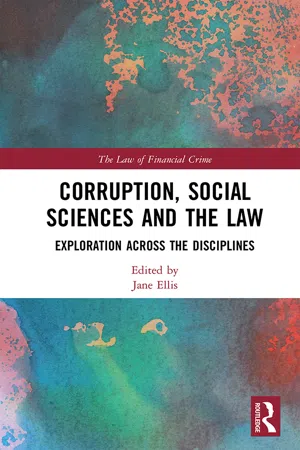
Corruption, Social Sciences and the Law
Exploration across the disciplines
- 280 pages
- English
- ePUB (mobile friendly)
- Available on iOS & Android
About This Book
The problem of corruption, however described, dates back thousands of years. Professionals working in areas such as development studies, economics and political studies, were the first to most actively analyse and publish on the topic of corruption and its negative impacts on economies, societies and politics. There was, at that time, minimal literature available on corruption and the law.
The literature and discussion on bribery and corruption, as well as on the negative impact of each and what is required to address them, particularly in the legal context, are now considerable. Corruption and anti-corruption are multifaceted and multi-disciplinary. The focus now on the law and compliance, and perhaps commercial incentives, is relatively easy. However, corruption, anti-corruption and the motivations for them are complex. If we continue to discuss, debate, engage, address corruption and anti-corruption in our own disciplinary silos, we are unlikely to significantly progress the fight against corruption. What do terms such as 'culture of integrity', 'demand accountability', 'transparency and accountability' and 'ethical corporate culture' dominating the anti-corruption discourse mean, if anything, in other disciplines? If they are meaningless, what approach would practitioners in those other disciplines suggest be adopted to address corruption. What has their experience been in the field? How can the work of each discipline contribute to the work of whole and, as such, improve our work in and understanding of anti-corruption? This book seeks to answer these questions and to understand the phenomenon more comprehensively. It will be of value to researchers, academics, lawyers, legislators and students in the fields of law, anthropology, sociology, international affairs, and business.
Frequently asked questions
Table of contents
- Cover
- Half Title
- Series Page
- Title Page
- Copyright Page
- Acknowledgements
- List of contributors
- Foreword, Leah Ambler
- Introduction
- 1. Corruption: The shape of the beast
- 2. The history of corruption and the benefits of a historical approach
- 3. Bribery, corruption and the law
- 4. Reduction of corruption as good governance
- 5. Cui bono? Corruptors and the corrupted – corporate governance and corruption: The roles and responsibilities of the private sector
- 6. Tackling corruption through corporate social responsibility
- 7. A political science perspective: From debate to détente
- 8. Discourse of corruption and anti-corruption
- 9. Corruption: A sociological approach
- 10. The morality of corruption in organisations
- 11. Using systems thinking to understand and address corruption in the criminal justice system in fragile states
- 12. Social norms and attitudes towards corruption: Comparative insights from East Africa
- 13. Corruption: Killing the beast
- 14. Explorations across the disciplines
- Index